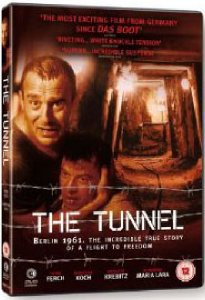The Tunnel
Introduction
The Berlin Wall was arguably the most infamous landmark of the 20th Century, finally being brought down on 9th November 1989. The wall had been erected as first a barbed wire fence in August 1961 and thus closed off East Berlin from the rest of West Germany for the next 28 years. The decision to raise the wall in the first place was primarily an economic one. Although the division of Berlin into four sectors had always been controversial, mass migration from the Soviet sector and the German Democratic Republic was getting out of control. By 1961 over 3.5 million East Germans had defected to the West through Berlin, nearly 20% of the whole population and this had the impact that the working age population of the GDR shrank from 70% to 61%. Although the vast majority of defections were political as far as the defectors were concerned, the authorities had little choice but to look upon the situation as more economic. The Berlin Wall had the effect of stopping mass defections, but didn't stop people trying to defect to West Germany. Between 1961 and 1989, approximately 5,000 people attempted to escape over the wall, of which somewhere between 100 and 200 are estimated to have died.
The Tunnel is a German language film, originally made back in 2001 but only just released on DVD now, that seeks to explore the early years of the Berlin Wall and more specifically the most famous of numerous tunnels that were made. East German swimming champion Harry Melchior Heino Ferch) hates the communist regime, famously refusing to shake the hands of party officials when winning the race to crown him champion and ending up in prison because of it. Melchior is close to his sister Lotte (Alexandra Maria Lara) and her daughter and wants them all to escape from the oppression of the GDR authorities but Lotte's husband Theo (Heinrich Schmeider) is doing well and sees no point in escaping. Disheartened, Melchior manages to waltz through security with a fake passport, a stick on moutache and some boot polish to make him look a bit older.
Meanwhile Harry's friend Matthis Hiller (Sebastian Koch) and pregnant wife Carola (Claudia Michelsen) decide to try and escape through the sewers as part of a large group but become separated as the group is discovered and chased by the GDR police. Matthis manages to get across but Carola is captured and sent to prison. With the sudden arrival of the fences, Harry and Matthis must rethink their plans to get their relatives out. Joining up with West Berliner, Fred (Felix Eitner), and Italian American amputee Vic Castanza (Mehmet Kutulus), the quartet decide on an idea by engineer Matthis to construct a tunnel from an abandoned factory just in front of the frontier and stretch nearly 145m to an abandoned house on the other side of the fence. Before long they are joined by young female Fritzi, who overheard their plans in the pub and wants to help in order to help her boyfriend escape from the East.
As time goes by and the tunnel doesn't really make much progress, the gang realise that they need more help. With sponsorship from NBC, who want to make a documentary about it, the tunnellers are able to recruit more people to help them and better tools, but the list of people to rescue from the East also grows. Despite the involvement of NBC, all work still needs to be kept secret in order to avert the attentions of GDR security forces but it's leader Colonel Krüger (Uwe Kockisch) is aware that something is afoot due to the inevitable contact between Vic Constanza and Lotte Lohman. Can Harry and Matthis get everyone including their loved ones out?
Extras
Sadly none, despite there being an absolute surfeit of relevant material out there. Shame really as there is around 20 minutes room on the disc after the running time of the film, but anything too sustantial would have pushed it into 2 disc terroritory which I'm guessing would have been too costly based on their sales projections.
Overall
This film has been compared to Das Boot as a must see exciting film and whilst there is a link to the earllier submarine film, it's only in that it also started life as a TV mini series - albeit one that won more than a couple of awards. In truth, this is really a companion piece to The Lives Of Others as an examination of life under communist rule. Directed by Roland Suso Richter, this 160 minute film never seems to be that long, it keep the narrative flowing nicely and never seems to drag in any area.
The acting is superb, especially from Heino Ferch (Downfall as Albert Speer) and Sebastian Koch (Black Book and The Lives of Others). Although based on a true story, there are clearly a couple of liberties taken with the truth but nothing that would spoil the overall enjoyment of the story. It's a darkly atmospheric film with the oppression of the GDR communist authorities looming large over everything. Despite this, there are rules that the communist regime must follow, such as Vic's treatment when picked up in East Berlin but also the one shown right at the denouement. As a true story, it is an incredible act of bravery of a handful of men and women to attempt to rescue their loved ones from the opppression of the East and well worth a watch if you can bear the original German language with English subtitles.
The Tunnel joins a growing handful of German films that are really must sees, such as Downfall, The Lives of Others, Das Boot and The Baader Meinhoff Complex.
Recommended.

Your Opinions and Comments
Be the first to post a comment!